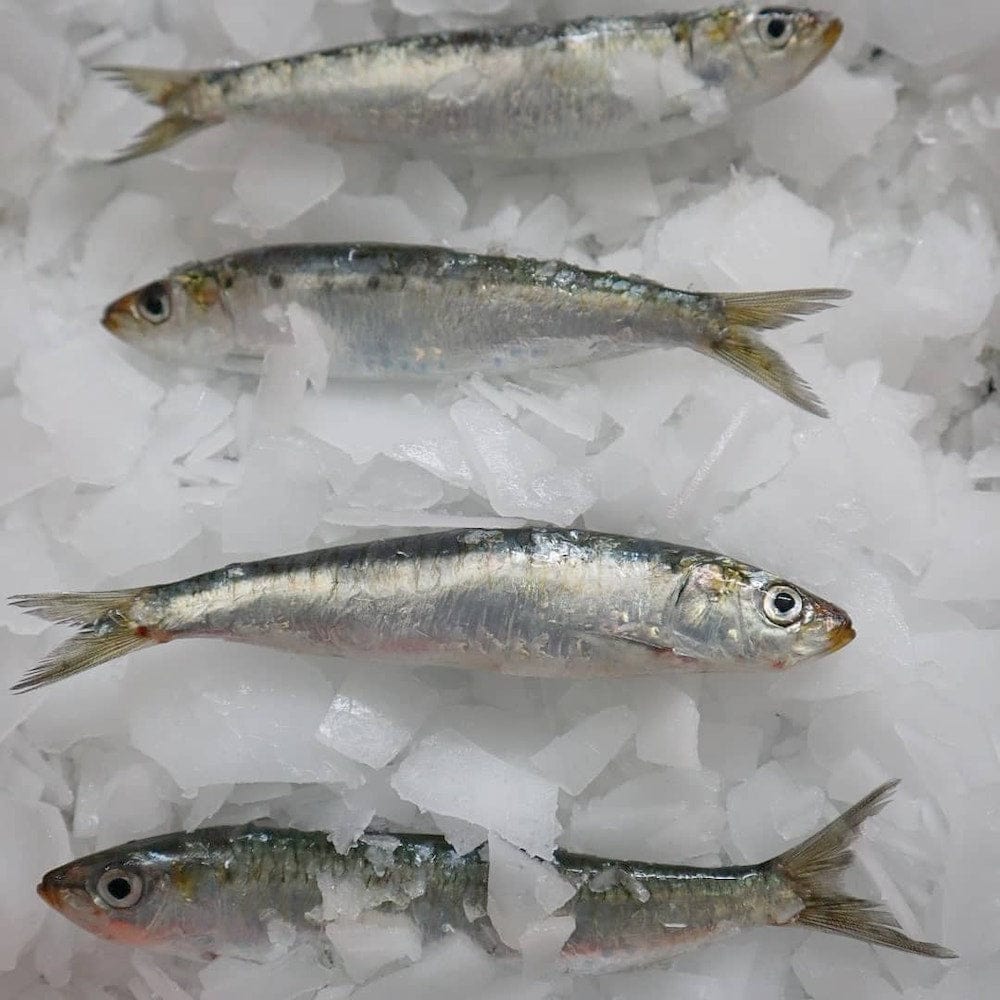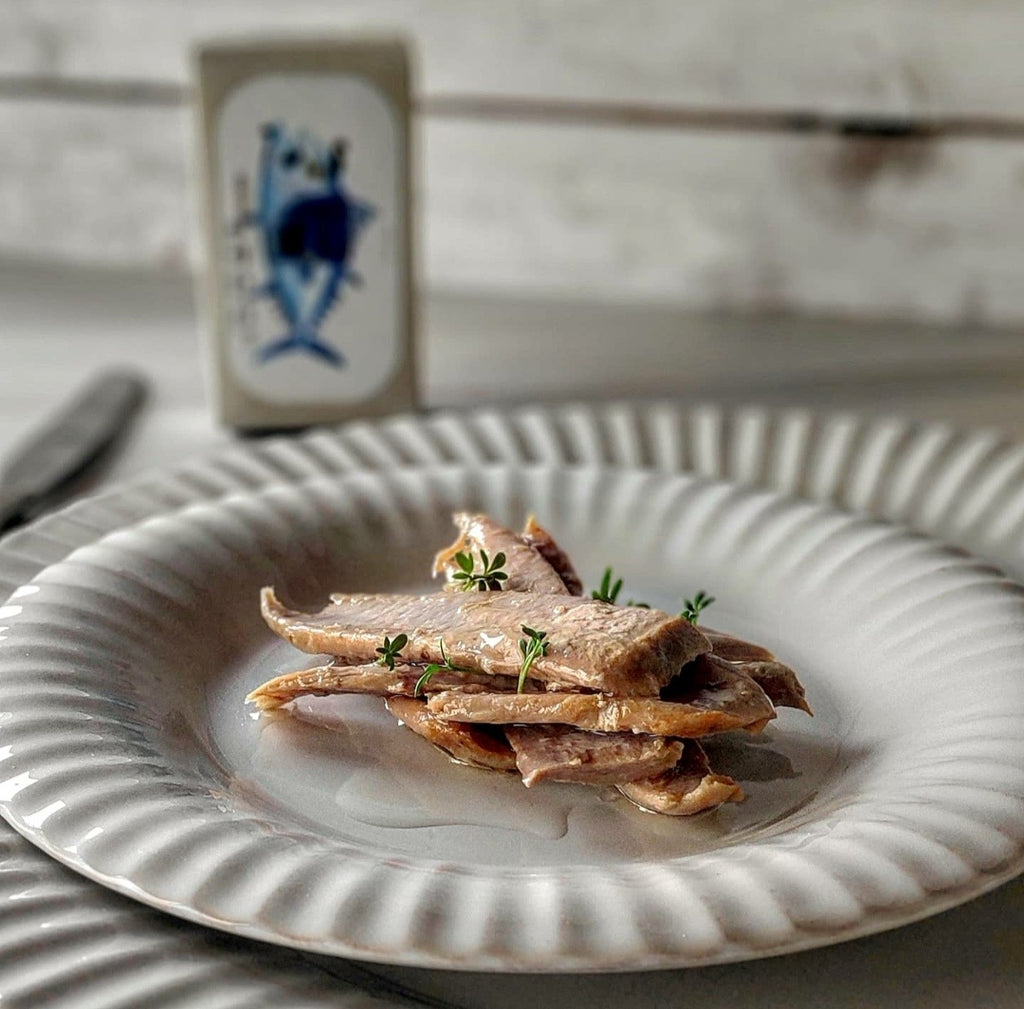Sardines were once a plentiful fish in most oceans, easy to catch, easy to preserve and easy to eat.
Today, it is becoming rare, its fishing is controlled and subject to quotas and it is difficult to distinguish frozen sardines from Morocco from fresh sardines from Portugal or Brittany.

Sardines - Credit Subocéa
The sardine, an ancient history.
The Phoenicians, between 1200 and 300 BC, fished sardines on a large scale and preserved them in salt. For the Egyptians, Greeks and Romans, sardines were a common food, eaten fresh or also preserved in salt barrels.
In the Middle Ages, sardines were consumed throughout Europe. It was then discovered that it could be preserved in vinegar, olive oil or melted butter.
The appertized canning was invented in 1795 by Nicolas Appert but it is from the second half of the 19th century, after several improvements, that this process of conservation is spread on a large scale.
In Portugal, it all began in Vila Real de Santo António when, in 1865, sterilization was used for the first time in a tuna processing plant owned by the Ramirez company.

Sardine cannery - Credit Fidès
In 1950, there were more than 400 canneries throughout Portugal. Today, there are still 14 that stand out for the quality of their production due to the freshness of the sardines and the production methods that have remained artisanal.

Old fishing boat on the beach of Nazaré - Credit unknown
In Portugal, the canneries are concentrated around 6 fishing ports: Matosinhos near Porto, Peniche between Porto and Lisbon, Sesimbra and Setúbal south of Lisbon, Portimão and Olhão in the south of Portugal.
All canneries are located near these ports and only work with very fresh sardines, some of them do not even need a cold room.
Here, there is no question of using frozen sardines from Morocco. In any case, the sardine, a fatty fish, does not tolerate freezing very well.

Map of Portuguese canneries - Credit Publico
In these times when small-scale fishing is confronted with industrial fishing, when the scarcity of the species imposes ever tighter quotas, when international competition is increasingly fierce, when pressure on prices imposes productivity gains... How to identify the best canned sardines?
Check the origin of sardines.
The word "sardine" is often used, wrongly, to designate about twenty species of small fish: sardinella, sardinops, sprats, anchovies, herrings... which can have very different tastes and properties.
The real sardine is the "Sardina pilchardus" which evolves off the coasts, in sometimes very compact schools, between 10 and 50m under the surface.

Sardina pilchardus - Credit Papa Anzóis
The "Sardina pilchardus" is found in the Mediterranean but especially in the North Atlantic Ocean from Ireland to the Azores through France, Portugal and Morocco.
Check the origin of the fish.
The constraint today for these canneries that have maintained a tradition of excellence is the scarcity of the species "pilchardus" and the decrease in fishing quotas that follows.
Sardina pilchardus should be caught between early May and late October. Before and after these dates, the fish are not fat enough or are in a spawning period.

These canneries are therefore 100% dependent on Portuguese fishing areas and refuse to source elsewhere at the risk of reducing the quality of their production.
Check the canning method .
As soon as they return from the boats, the fresh sardines are scaled, gutted and then pre-cooked in oil or steam. They are then manually placed in their cans after being selected. The cans are then filled with quality olive oil and crimped before being sealed.

Papa Anzóis canning
All these operations are manual, which is the guarantee of perfectly selected sardines, prepared and stored in their cans. The automation of these processes as well as the use of frozen sardines strongly reduces the quality of the canned sardines in terms of taste and texture.
Sardines or sardine fillets?
The sardines are prepared before being cooked. Their head is removed, they are gutted and the fins are removed. All these operations are manual and repeated, after cooking, before the final canning.
This means that the skin and bones are preserved. According to some, this is essential because the taste of the sardine is better preserved and the calcium intake is higher. After a few months, the skin and bones almost disappear and melt into the flesh.

Sardines in olive oil José Gourmet - Luisa Paixão collection
However, others find the presence of skin and bones unpleasant. There are canned sardine fillets without skin and bones.
These are a little more expensive because the handling is much more numerous but it is the guarantee of a can containing only the flesh of the sardine fillets.
Canned sardine fillets José gourmet - Luisa Paixão collection
Sardines or small sardines?
The cans usually contain 4 sardines. These are calibrated to completely fill a can. I encourage you to discover the Portuguese "petingas". They are smaller sardines arranged by 6 in a can. It's all a matter of taste, but for me, they are tastier and more tender.

Petingas José Gourmet - Luisa Paixão collection
Olive oil or vegetable oil?
Gourmets say that the best canned sardines are those prepared in olive oil, "trimmed in white", because it is the white belly of the sardine that is offered to the eye.

Sardines in olive oil dressed with white Ati Manel - Luisa Paixão collection
Others prefer sardines to peanut oil. In fact, it is all a matter of taste. The aroma of olive oil ends up merging with that of the sardine, while peanut oil would preserve the taste of the fish better.
Canned sardines in sauce ?
Gourmets swear by preserved sardines simply prepared with olive oil, but there are many other tasty preparations that must be discovered.
Of course, you will easily find canned sardines with a fillet or a slice of lemon, canned sardines with a simple tomato sauce or spiced up with Portuguese piri-piri.

Canned sardines with tomato José gourmet - Luisa Paixão collection
I also recommend you try the sardine preserves called "à l'escabèche", a marinade made with oil, vinegar, bay leaves, parsley, tomato puree and garlic. You will also find preserves prepared with olive oil and curry, olive oil and red peppers, pepper, oregano, pickles... Ideal variations to prepare an aperitif.
Should sardine cans be left to age?
The legislation in force obviously applies to canned sardines and no trader is allowed to sell canned goods that are past their use-by date.
This deadline is generally 2 years after canning for sardines.
But the sardine can gets better with age because, with time, an osmosis occurs between the fish and the oil. Some people even enjoy them after seven or eight years, taking care to turn the cans over every six months (which is actually unnecessary and is linked to the habits of the past when the cans were not filled to capacity).
A good can of sardines is an old can of sardines.
What about vintage sardines?
The so-called "vintage" sardines are a pure marketing invention. In fact it simply means that the sardines canned are from the same fishing season. This is the case of all canned sardines in Portugal.
On the other hand, an industrialist who uses frozen sardines from Morocco, all from the same fishing season (i.e. frozen at the same time) can call his production "vintage sardines", which is the last straw!
Very often, our customers ask us for these vintage sardines because they have tasted them at friends' houses or in restaurants !!!! We can't sell canned sardines that are past their use-by date, even if they are better. It is forbidden by the legislation.
On the other hand, nothing prevents you from storing your preserves for a tasting in a few years.
Sardines are excellent for your health.
 Proteins and Omega-3 fatty acids. First of all, sardines are a very good source of protein, an essential source of energy for the human body. It also contains 10 to 12% lipids but with a very high proportion of Omega-3 fatty acids which effectively restore the proportion between Omega-6 and Omega-3 fatty acids and thus reduce the risk of cardiovascular disease.
Proteins and Omega-3 fatty acids. First of all, sardines are a very good source of protein, an essential source of energy for the human body. It also contains 10 to 12% lipids but with a very high proportion of Omega-3 fatty acids which effectively restore the proportion between Omega-6 and Omega-3 fatty acids and thus reduce the risk of cardiovascular disease.
 Essential vitamins and nutrients. Sardines also contain nutrients such as calcium, phosphorus or selenium with its anti-oxidant properties. In addition, it contains vitamin D and vitamins of the B group including vitamin B3 which regulates cholesterol and triglycerides.
Essential vitamins and nutrients. Sardines also contain nutrients such as calcium, phosphorus or selenium with its anti-oxidant properties. In addition, it contains vitamin D and vitamins of the B group including vitamin B3 which regulates cholesterol and triglycerides.

A fish little affected by pollution. The sardine is caught young (1 to 2 years) which does not give it time to accumulate mercury. Moreover, it is a small fish that is at the very beginning of the food chain and does not concentrate various pollutants. It is said to be a non-bioaccumulative fish.
Will canned sardines become a rare commodity? Consumers don't always realize when they open a can of sardines that this product may soon become a luxury item.















 Proteins and Omega-3 fatty acids. First of all, sardines are a very good source of protein, an essential source of energy for the human body. It also contains 10 to 12% lipids but with a very high proportion of Omega-3 fatty acids which effectively restore the proportion between Omega-6 and Omega-3 fatty acids and thus reduce the risk of cardiovascular disease.
Proteins and Omega-3 fatty acids. First of all, sardines are a very good source of protein, an essential source of energy for the human body. It also contains 10 to 12% lipids but with a very high proportion of Omega-3 fatty acids which effectively restore the proportion between Omega-6 and Omega-3 fatty acids and thus reduce the risk of cardiovascular disease.  Essential vitamins and nutrients. Sardines also contain nutrients such as calcium, phosphorus or selenium with its anti-oxidant properties. In addition, it contains vitamin D and vitamins of the B group including vitamin B3 which regulates cholesterol and triglycerides.
Essential vitamins and nutrients. Sardines also contain nutrients such as calcium, phosphorus or selenium with its anti-oxidant properties. In addition, it contains vitamin D and vitamins of the B group including vitamin B3 which regulates cholesterol and triglycerides. 
